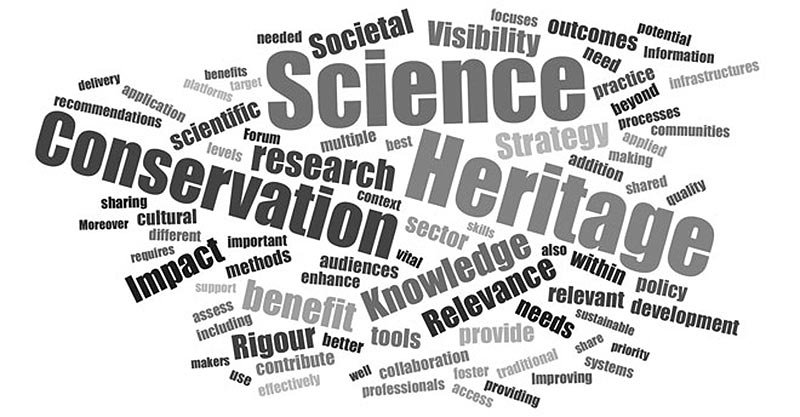The fundamental challenge for heritage science, as for any other science sector, is to deliver benefit. With regard to cultural heritage conservation, the relevance and effectiveness of heritage science is fundamentally reliant on bridging the gap between research and conservation practice to improve the care, understanding and sustainable use of cultural heritage. This demands adequate identification of needs, and responsiveness to address these in new ways when necessary, but also effective collaboration between disciplines and interest groups so that relevant knowledge is developed, transferred and implemented in practice.
To examine how well this is currently being acheived, in 2013 ICCROM together with a consortium of 15 institutional partners from 14 countries organized an international think tank on heritage conservation science. The ICCROM Forum 2013 brought together 80 people from diverse professional backgrounds within the heritage sector, to critically reflect on the current role and future directions of heritage science in the field of cultural heritage conservation (hereafter referred to as ‘ heritage conservation science’).
In its findings, the Forum highlighted the need for enhancing the integration, relevance and impact of science within the cultural heritage conservation sector, and increasing its capacity to deliver wider societal benefit.
The lack of visibility of the heritage conservation science sector was identified as a critical problem, together with the need for more active engagement with outside parties at multiple levels, from the public to governmental, to raise awareness and shape policy. Particular emphasis was also placed on the need for strategy development at a national and international level, and data collection to describe the sector and evidence its capacity to deliver benefit.
The recommendations of the ICCROM Forum 2013 are summarized below:
Defining a shared vision and mission
A shared vision and mission statement for the heritage conservation science sector is needed to clarify the sector’s purpose and role, and to place it more clearly within policy and funding frameworks.
Strategy development
Collaboration between producers and users of heritage conservation science knowledge is required to develop research strategies at multiple levels (organizational; national; regional), based on assessment and prioritization of needs, to enhance the relevance and effectiveness of heritage conservation science, and gain leverage with policy makers and funding bodies.
Demonstrating benefit
Demonstrating benefit is a priority. To attract political and financial support, heritage conservation science must provide evidence of the benefits that it delivers. At present the field lacks basic tools and data to demonstrate its effectiveness.
Influencing Policy
Heritage conservation science should seek to play a more active role in policy making processes, and contribute towards long term sustainable heritage policies. This requires strengthening of relationships with policy makers as well as a greater understanding of policy making processes, including the expected timeframes for the delivery of scientific evidence and advice. Such efforts could be facilitated through political science and governance studies.
Improving communication
There is a need to communicate better and more strategically at different levels within the sector and beyond. Here, in addition to improving communication between heritage professionals, heritage organizations can play a leadership role reaching out to multiple target audiences including policy makers and the public. Moreover, education programmes can contribute through communications skills training to develop the capacity of heritage professionals to share their work with different audiences through multiple dissemination platforms.
These recommendations were further developed and elaborated into a series of position papers, published as an open access issue of Studies in Conservation Supplement (vol. 2 2015). Available for download here

